Indians in US politics
(→The position in 2019) |
(→The position in 2020) |
||
| Line 144: | Line 144: | ||
A 38-year-old Indian-American lawyer has become the first South Asian woman to be elected to the New York state assembly. Jenifer Rajkumar, a Democrat, is a Stanford-educated immigrant rights advocate. She will represent New York City’s 38th assembly district. Indian-Ugandan Zohran Kwame Mamdani, son of filmmaker Mira Nair, also won a seat in the NY state assembly. Mamdani, 29, Democratic nominee for NY’s 36th assembly district, ran unopposed. AGENCIES | A 38-year-old Indian-American lawyer has become the first South Asian woman to be elected to the New York state assembly. Jenifer Rajkumar, a Democrat, is a Stanford-educated immigrant rights advocate. She will represent New York City’s 38th assembly district. Indian-Ugandan Zohran Kwame Mamdani, son of filmmaker Mira Nair, also won a seat in the NY state assembly. Mamdani, 29, Democratic nominee for NY’s 36th assembly district, ran unopposed. AGENCIES | ||
| − | [[Category:Diaspora|U | + | =The position in 2021= |
| + | '''20 Indian-Americans in Biden admin''' | ||
| + | |||
| + | President-elect Joe Biden has nominated at least 20 Indian-Americans, including 13 women, to key positions in his incoming administration, a record for the community that constitutes 1% of America’s population. As many as 17 of them, including Neera Tanden who has been nominated as the director of management and budget, would be part of the Biden administration in the White House. On Saturday, Biden nominated former foreign service official Uzra Zeya as the under secretary of state for civilian security, democracy and human rights. Biden has also nominated Vanita Gupta as the associate attorney general at the department of justice. “The dedication that the Indian-American community has shown to public service over the years has been recognised in a big way!” founder of the non-profit organisation Indiaspora, M R Rangaswami, said. PTI | ||
| + | |||
| + | [[Category:Diaspora|U INDIANS IN US POLITICS | ||
INDIANS IN US POLITICS]] | INDIANS IN US POLITICS]] | ||
| − | [[Category:India|U | + | [[Category:India|U INDIANS IN US POLITICS |
INDIANS IN US POLITICS]] | INDIANS IN US POLITICS]] | ||
| − | [[Category:Politics|U | + | [[Category:Politics|U INDIANS IN US POLITICS |
INDIANS IN US POLITICS]] | INDIANS IN US POLITICS]] | ||
| − | [[Category:USA|U | + | [[Category:USA|U INDIANS IN US POLITICS |
INDIANS IN US POLITICS]] | INDIANS IN US POLITICS]] | ||
Revision as of 07:08, 20 January 2021
This is a collection of articles archived for the excellence of their content. |
Contents[hide] |
The position in 2016
The Indian vote
See graphic.
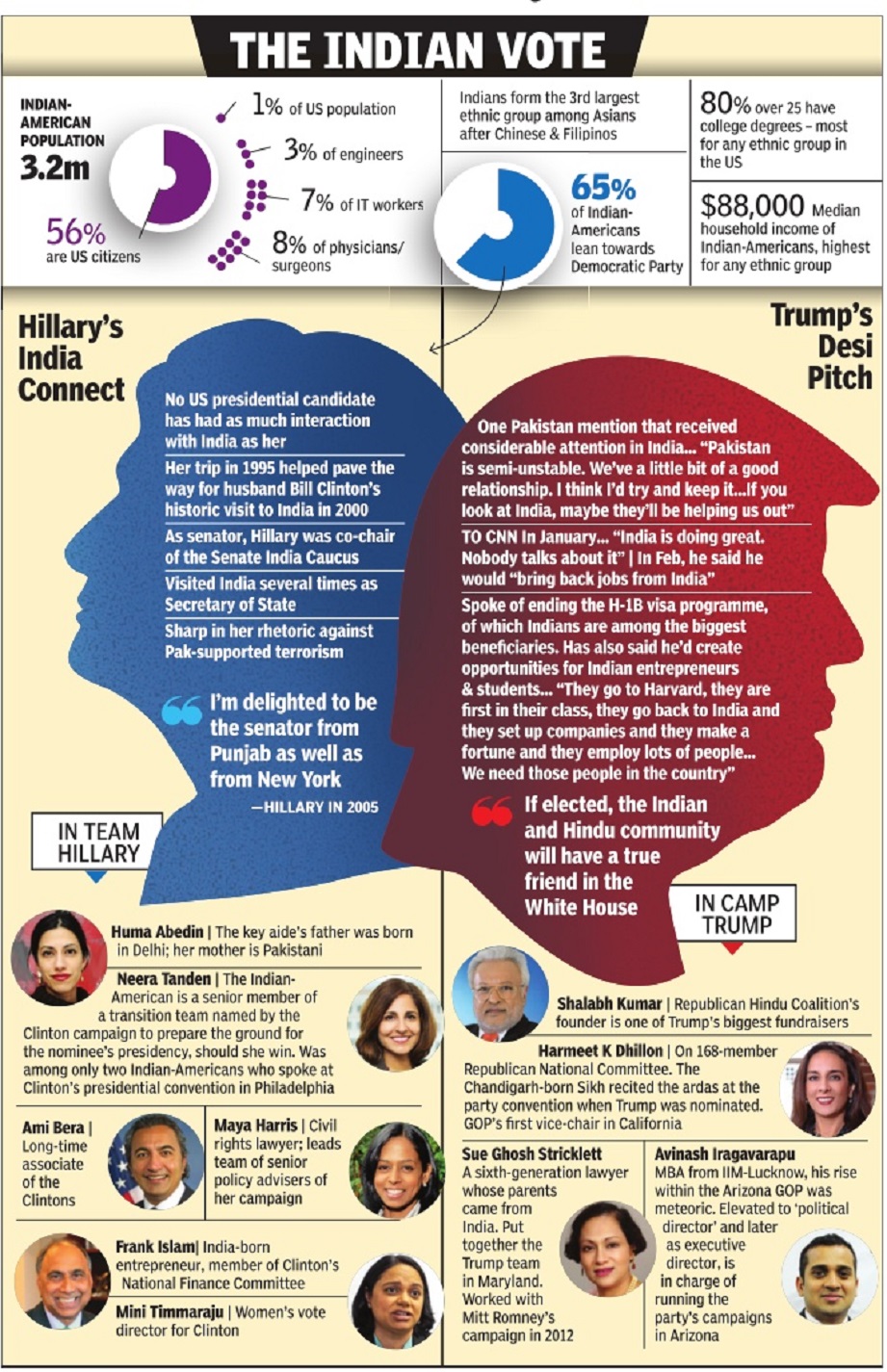
The Times of India
Nov. 2016: 5 PIOs, all Democrats elected to US Congress
All Of Them Democrats, 2 Are Women
Indian-Americans, and indeed New Delhi, will be chuffed by the victo ry of at least five candi dates of Indian origin in the US election -the largest contingent of PIO legislators ever to go to Capitol Hill.
California's attorney general Kamala Harris, a Democrat, won a Senate seat from California as was widely expected, making her the first senator of Indian origin.
Chidanand Rajghatta, 5 PIOs Climb Capitol Hill, Set A Record, Nov 10 2016 : The Times of India
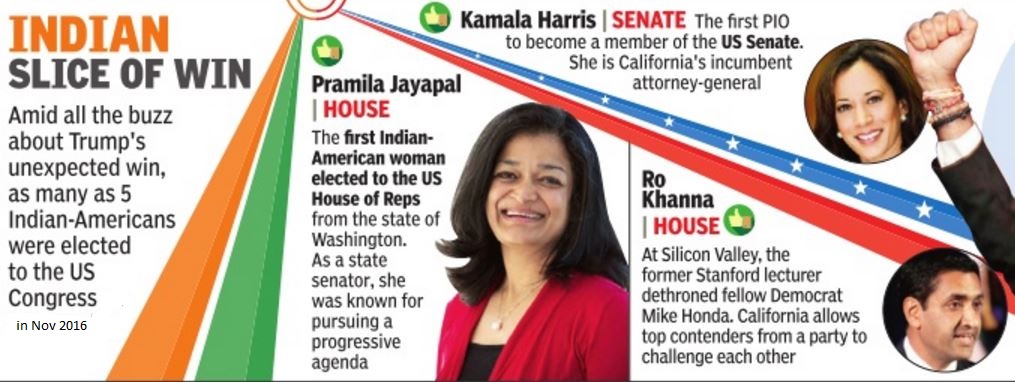
Pramila Jayapal, Kamala Harris, Ro Khanna
The Times of India
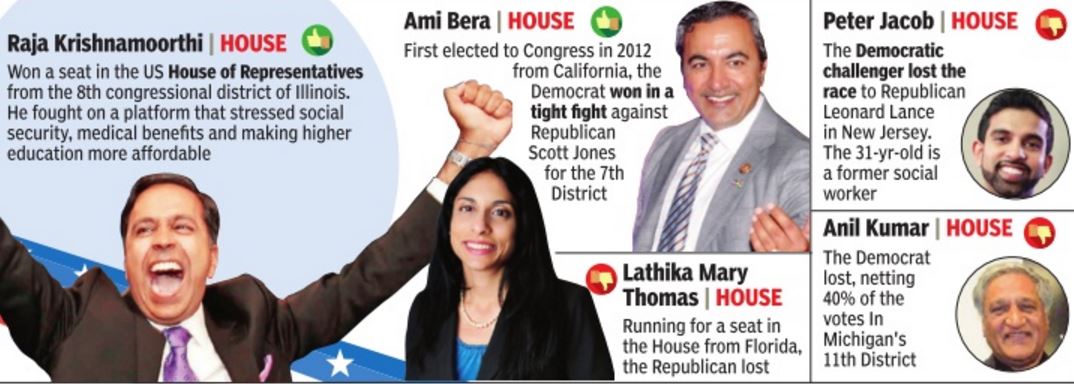
Ami Bera, Raja Krishnamoorthi won.
Lathika Mary Thomas, Peter Jacob and Anil Kumar did India proud by putting up a good fight.
The Times of India
Also making it to the Congress is Ro Khanna, whose campaign claimed victory from California's 17th district even though votes were yet to be fully counted and certified. The most striking thing about a Khanna win is that he will represent the heart of Silicon Valley.
Another landmark for the community comes in the form of a win for Pramila Jayapal, 51, who cantered to victory from a Washington state seat in and around Seattle, another white-collar entrepot with some of the most highly educated constituents in the country . She will be the first Indian-American Congresswoman. Joining Khanna and Jayapal will be Dr Ami Bera, also from a California district around Sacramento. He is coming up with a surprisingly easy third-term win.
Rounding up the win is Raja Krishnamoorthi, who bagged the 8th congressional district in Illinois, President Obama's home state, defeating Republican Peter DiCianni. All five Indian-Americans are Democrats.
The position in 2017
Indians 1%, get 1% representation
A new analysis by the Pew Research Center on the religious affiliation of American lawmakers has concluded that the “US Congress is about as Christian today as it was in the early 1960s... although the share of US adults who describe themselves as Christians has been declining for decades.“
The study says among members of the new, 115th Congress that was sworn in in January 2017, 91% describe themselves as Christians.This is nearly the same percentage as in the 87th Congress (1961 to 1962, the earliest years for which comparable data are available), when 95% of members were Christian.
Among the 293 Republicans elected to serve in the new Congress, all but two identify as Christians; the only exceptions are two Jewish Republicans -Lee Zeldin of New York and David Kustoff of Tennessee. Democrats in Congress also are overwhelmingly Christian (80%), but there is more religious diversity on this side of the aisle. The 242 Democrats in Congress include 28 Jews, three Buddhists, three Hindus, two Muslims and one Unitarian Universalist -as well as the only member of Congress to describe herself as religiously unaffiliated.
According to the poll, the number of Hindus in Congress rose from one to three, as Ro Khanna (D-Calif), and Raja Krishnamoorthi (D-Illinois) joined Tulsi Gabbard (D-Hawaii) who was first elected to the 113th Congress (2013 to 2014) and has been re-elected twice, among those who identified themselves as Hindus.
It is not clear why the sur vey did not count Washington state lawmaker Pramila Jayapal, who also lists her religious affiliation as Hindu. Another Indian-American lawmaker, California's Ami Bera calls himself a “Unitarian Universalist“, while the religious affiliation of Senator Kamala Harris is not known, although she campaigned heavily in Black and Methodist churches during the election.
The current US Congress has just two Muslim lawmakers constituting 0.37% representation for a community that is 1% of the US population. Jews, who make up 2% of the US adult population, hold 30 seats in the new Congress (6%), up from 28 seats in the 114th (5%).
Hindus, counting Jayapal, appear to be proportionally represented to their population, which according to a Pew Study is 2.23 million, or 0.7% of the population.
The position in 2018
Indians in US midterms fail to grow
All four Indian-American incumbents in the US House of Representatives were re-elected fairly comfortably in Tuesday’s Congressional elections. But the so-called “ Samosa caucus + ” – the moniker for desi lawmakers’ group on the Hill -- failed to add to its strength, with a dozen other aspirants coming up short.
Sitting members Ami Bera (California 7 th District), Ro Khannna (California 17 th district), Pramila Jayapal (Washington 7 th District), and Raja Krishnamoorthi (Illinois 8 th district) all retained their seats, Bera for a fourth term and others for a second term.
In fact, Jayapal polled 83 per cent of the votes cast in her district, Khanna bagged 72 per cent, and Krishnamoorthi bagged 65 per cent, attesting to the Democratic credentials of their districts. Bera, whose previous three victories were all narrow and involved recounts, sailed through relatively comfortably this time, polling almost 53 per cent votes to his opponent’s 47 per cent.
Tulsi Gabbard, the self-professed Hindu-American, also retained her seat in Hawaii.
But newbie aspirants elsewhere came up short: Two Indian-American women put up a decent fight in Arizona before losing to their Republican rivals: Physician Hiral Tipirneni polled 94,000 votes to Debbi Lesko’s 123,000 in Arizona’s 8 th district in a race that attracted national attention. Also in Arizona 6 th district, Anita Malik polled 95,000 votes to David Schweikert’s 123,000 votes.
In Texas, former State Department foreign service official Sri Preston Kulkarni 137,500 votes against five-term Republican incumbent Pete Olson’s 152,000 votes.
In other House results involving desis, Republican Bill Posey 217,000 votes defeated Sanjay Patel (D) 142,000 in Florida’s 8 th district; Republican Rick Crawford 138,000 votes defeated Chintan Desai (D) 57,500 votes in Arkansas 1 st district, and Jim Himes (D) 165,000 votes defeated Republican Harry Arora 106,000 votes in Connecticut 4 th district
However, scores of Indian-Americans who ran for state legislature and local offices such as school county boards tasted success as the “desi” community continued to make incremental inroads and progress in US public life.
According to PTI, Democratic Nima Kulkarni defeated Joshua Neubert from the GOP to make her maiden entry into the Kentucky Assembly from State District 40. Mujtaba Mohammed entered the North Carolina State Senate from the Senate District 38. Incumbent Jay Chaudhuri, an accomplished entrepreneur, was re-elected to North Carolina Senate from the State Senate District 15. And Republican Niraj Atani, 27, registered his third consecutive electoral victory from Ohio House 42nd District.
In Washington State, Manka Dhingra and Vandana Slatter were re-elected for the State Senate. Among others re-elected at the State level are Sabi Kumar in Tennessee and Ash Kalra (California).
Tuesday’s election also saw a surge of women and minorities (mostly from the Democratic Party) breaking through the white establishment that has long dominated US politics.
Among the stars of the day was Socialist Alexandria Ocasio-Cortez, who at 29, became the youngest EVER woman elected to Congress.
Democrats Sharice Davids (Kansas) and Deb Haaland (New Mexico) also became the first Native American women elected to Congress. And Michigan Democrat Rashida Tlaib (a Palestinian-American) and Ilhan Omar (a Somali-American) of the Minnesota Democratic-Farmer-Labor Party became the first Muslim women in Congress.
2018: 17 PIOs in the fray for HOR
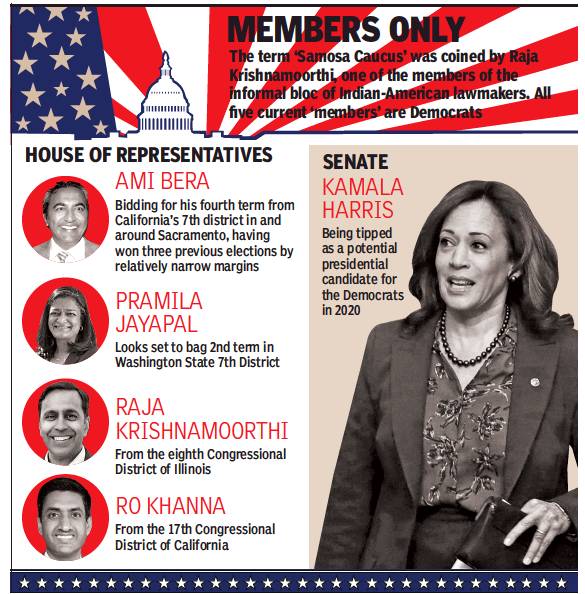
From: Chidanand Rajghatta, ‘Samosa Brigade’ spices up US election for Indian-Americans, November 5, 2018: The Times of India
Group Of 5 PIO Lawmakers Set To Grow With 12 More In Fray
A spicy sidebar that has Indian-Americans involved or interested in one of the most virulent election in American history pertains to the ‘Samosa Caucus’ — and whether it will grow in strength from its current four members.
Samosa Caucus is the term used to describe the group of Indian-American lawmakers in Congress — Ami Bera, Pramila Jayapal, Raja Krishnamoorthi and Ro Khanna in the House of Representatives and Kamala Harris in the Senate. All four representatives are up for re-election in Tuesday’s midterm election after serving a two-year term, and with another dozen Indian-Americans on the ballot on November 6, there are hopes the samosa brigade will be strengthened.
Easier said than done, though. The US House of Representatives has a very high rate of incumbency re-election, an inertia that has led to the term ‘Congressional stagnation’, although the retirement of some 42 Congressmen this election cycle has led to openings for many aspirants. Even so, the rate of incumbency reelection in recent years this rate has over 90%, with rarely more than ten sitting members losing their House seats every election cycle.
Sri Kulkarni would know it how hard it is to break into Congress. A US Foreign Service officer who resigned from the administration to challenge five-term Republican Pete Olson in Texas’ 22nd Congressional district, his is one of the most watched races in the country because of the energy and verve he has brought to the campaign. Asian Americans make up 19.2% of the population in this district southwest of Houston, and the polyglot Kulkarni’s outreach has involved reaching the diverse constituency in a dozen languages, including Hindi, Mandarin, Turkish, Nepalese, and Sinhala, given that 40% of the district speaks a language other than English.
Still he still faces a formidable task in ousting Olson, himself not shy of showcasing his global embrace, turning up in sherwanis and bandis to desi fundraising events and bragging about his close ties to PM Modi, and Houston’s energy connections to India. But such is the threat from Kulkarni to what was till recently considered a Republican pocketborough that Olson took the very red route of referring to his opponent as an “Indian-American carpetbagger”, although Kulkarni traces his ancestry from his mother’s side to Sam Houston, the hero of the “Texas revolution”. Although Olson is expected to retain his seat, Kulkarni’s energetic campaign could provide an upset if there is indeed a socalled Democratic “blue wave” that has been spoken about but never seen or felt.
A similar challenge of breaking through the established Republican fortress faces Hiral Tipirneni and Anita Malik, two Indian-American women fighting to oust incumbents in Arizona. Tipirneni, a physician, is locked in what is a rematch of the race she lost in April this year to Republican Debbie Lesko in a byelection, and latest polls show her trailing by a mere four points, within the margin of error. Tipirneni has also raised more money than Lesko for the November race, and if indeed there is a blue wave, she could overcome the deficit come Tuesday.
The fact that Lesko sees Tipirneni as a threat became evident when her campaign began using “fake doctor” signs — simply because the Indian-American had not been a practicising physician for over a decade, necessitating an intervention from the Arizona Medical Political Action Committee that viewed the campaign signs against Dr Tipirneni “as an insult to the medical profession, discounting the education and training required of physicians to become licensed and credentialed”.
While most other “desi” challengers are seen as alsorans, the four incumbent Indian-American lawmakers, all Democrats, are expected to retain their seats. California’s Dr Ami Bera is bidding for his fourth term from the state’s 7th district in and around Sacramento, having won three previous elections by relatively narrow margins. But he is expected to have an easier time this cycle against an opponent who is a marine. Elsewhere in California 17th District, Ro Khanna, whose constituency encompasses most of Silicon Valley and includes storied companies such as Apple and Intel, looks set to win a second term, as does Pramila Jayapal in Washington State, whose 7th district is also considered a Democratic fortress.
The position in 2019
Kamala Harris, Tulsi Gabbard bid for White House
Chidanand Rajghatta, Kamala joins Tulsi in run for White House, January 22, 2019: The Times of India
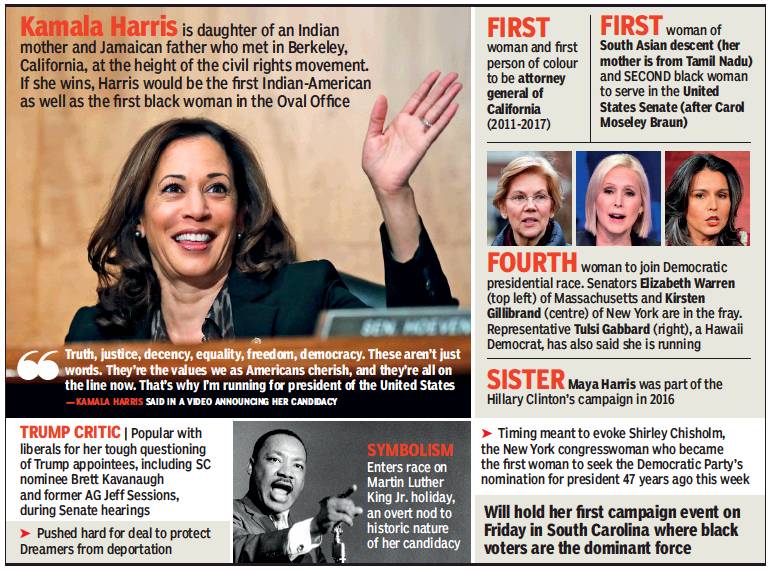
From: Chidanand Rajghatta, Kamala joins Tulsi in run for White House, January 22, 2019: The Times of India
California Senator, Dubbed ‘Female Obama’, Seen As Frontrunner For Democratic Nomination
Indian-Americans, and US Democrats at large, will face a choice between Tulsi and Kamala among others in a race from the left to challenge Donald Trump for the White House in 2020.
In an announcement that was not entirely unexpected, Kamala Harris, the Indian-African-American first-term Senator from California, announced on Monday that she is running for president in 2020, saying that the time has come to fight against “the injustices... of the Trump presidency”. However, to get into the final stretch of the race Harris will first have to clinch the Democratic nomination in what is adding up to be a crowded field. Aside from Hawaii Congresswoman Tulsi Gabbard, a Hindu-American of Caucasian descent, two other women have been exploring the field – Massachusetts Senator Elizabeth Warren and New York Senator Kirsten Gillibrand. Then there are the men: Former vice-president Joe Biden and Vermont Senator Bernie Sanders among them.
In purely numerical terms, the Democratic field is starting to resemble the Republican gaggle of 17 candidates that ran for the GOP nomination in 2016 when New York businessman Donald Trump, rather unexpectedly, clambered over the likes of Jeb Bush, Ted Cruz, Marco Rubio and others to win the party ticket to face Hillary Clinton. For 2020, it is Trump who appears to be a shoo-in for the Republican ticket with more than a dozen Democrats duking it out to face him.
But Harris, who some commentators have dubbed as a “female Barack Obama” (Bi-racial, first-time Senator, new generation, and left of center) has straightaway become the front-runner. The Spectator Index put her chances of winning the Democratic nomination at 25%, ahead of Beto o’Rourke (20%), Joe Biden (17%) Bernie Sanders (13%) Elizabeth Warren (10%) and Other (15%).
Daughter of immigrants from Jamaica and India, Harris, 54, declared her intention to run on what is Martin Luther King Jr Day in an appearance on Good Morning America, following it up with a brief video of her campaign released on social media. “The future of our country depends on you and millions of others lifting our voices to fight for our American values,” the former prosecutor and attorney general of California said in the video. “That’s why I’m running for president of the US. I’m running to lift those voices, to bring our voices together.”
Harris’ mother Shyamala Gopalan, who passed away in 2010, was a breast cancer researcher who immigrated to the US from Madras (now Chennai) in 1960. Her father, Donald Harris, is a Stanford University economics professor who emigrated from Jamaica in 1961 for graduate study in economics at University of California, Berkeley. They divorced when she was 7, and Kamala and her sister Maya, a civil liberties activist, grew up with their mother, who was granted custody of the children by court-ordered settlement.
Although she identifies herself primarily as African-American, as indeed does the US media, Harris has spoken in the past about her influential Indian past that involved summer holidays in Chennai’s Besant Nagar, where she visited her maternal grandfather, P V Gopalan, a freedom fighter and an Indian diplomat.
She later attended Howard University in Washington, DC, where she majored in political science and economics, before returning to California, where she earned her Juris Doctor (JD) from the University of California, Hastings College of the Law, and was subsequently admitted to the State Bar in 1990 before going to become the first-ever female district attorney in San Francisco and the first black DA in all of California.
Harris is married to Doug Emhoff, a media, entertainment and intellectual property partner with two children from his earlier marriage. Her sister Maya, who will be her campaign chair, is a former senior adviser to Hillary Clinton’s presidential campaign. She announced that her campaign headquarters will be based in Baltimore.
Harris’ declaration of a White House run, while dispensing with the exploratory committee preamble, was timed with the Martin Luther King Jr Day, and her campaign noted that Shirley Chisholm, the first black woman to run for president in a major party, launched her campaign 47 years ago this week. “The thing about Dr. King that always inspires me is that he was aspirational...like our country is aspirational,” Harris said. “I’m honoured to be able to make my announcement on the day we commemorate him.”
The position in 2020
State assemblies
New York
Desi lawyer in NY assembly
A 38-year-old Indian-American lawyer has become the first South Asian woman to be elected to the New York state assembly. Jenifer Rajkumar, a Democrat, is a Stanford-educated immigrant rights advocate. She will represent New York City’s 38th assembly district. Indian-Ugandan Zohran Kwame Mamdani, son of filmmaker Mira Nair, also won a seat in the NY state assembly. Mamdani, 29, Democratic nominee for NY’s 36th assembly district, ran unopposed. AGENCIES
The position in 2021
20 Indian-Americans in Biden admin
President-elect Joe Biden has nominated at least 20 Indian-Americans, including 13 women, to key positions in his incoming administration, a record for the community that constitutes 1% of America’s population. As many as 17 of them, including Neera Tanden who has been nominated as the director of management and budget, would be part of the Biden administration in the White House. On Saturday, Biden nominated former foreign service official Uzra Zeya as the under secretary of state for civilian security, democracy and human rights. Biden has also nominated Vanita Gupta as the associate attorney general at the department of justice. “The dedication that the Indian-American community has shown to public service over the years has been recognised in a big way!” founder of the non-profit organisation Indiaspora, M R Rangaswami, said. PTI